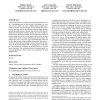Free Online Productivity Tools
i2Speak
i2Symbol
i2OCR
iTex2Img
iWeb2Print
iWeb2Shot
i2Type
iPdf2Split
iPdf2Merge
i2Bopomofo
i2Arabic
i2Style
i2Image
i2PDF
iLatex2Rtf
Sci2ools
CCS
2003
ACM
2003
ACM
Origin authentication in interdomain routing
Attacks against Internet routing are increasing in number and severity. Contributing greatly to these attacks is the absence of origin authentication: there is no way to validate claims of address ownership or location. The lack of such services enables not only attacks by malicious entities, but indirectly allow seemingly inconsequential miconfigurations to disrupt large portions of the Internet. This paper considers the semantics, design, and costs of origin authentication in interdomain routing. We formalize the semantics of address delegation and use on the Internet, and develop and characterize broad classes of origin authentication proof systems. We estimate the address delegation graph representing the current use of IPv4 address space using available routing data. This effort reveals that current address delegation is dense and relatively static: as few as 16 entities perform 80% of the delegation on the Internet. We conclude by evaluating the proposed services via traced bas...
Address Delegation | Address Delegation Graph | CCS 2003 | Origin Authentication | Security Privacy |
Related Content
| Added | 06 Jul 2010 |
| Updated | 06 Jul 2010 |
| Type | Conference |
| Year | 2003 |
| Where | CCS |
| Authors | William Aiello, John Ioannidis, Patrick Drew McDaniel |
Comments (0)

